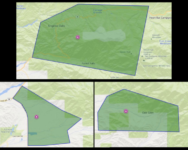Numerous residents in the mountain communities have been receiving scam telephone calls related to banking, and this tends to be a more frequent occurrence in smaller towns and rural communities, according to Richard Miller, Compliance and Information Security Officer for First Mountain Bank. “It’s a computer program,” Miller explains, “they get the prefixes, like 866, and then just start calling until people answer the phone. They don’t have a name and a number; they just have a phone number. The phone scams have been going on for years, but they’re getting more prevalent.” These automated scam phone calls may ask for a debit card number or password, which Miller advises you never give out over the phone. Per Miller, “No bank should call, email or anything else to verify your information, because they already have that info. So, never give a password or pin number to anyone, especially if on the phone.” However, he adds, “We’re a small enough, local bank that we will contact you if, say, you are overdrawn. We will never call to ask you for verification but, if you call the bank, we will ask you information to verify you are who you say you are.” As for email contact from a financial institution, Miller advises, “Don’t give out any pertinent information via email or online, unless you are in a secure site that you’ve initiated with the bank, and you’re just logging in. Any time you get something that says you requested it, and you didn’t request it, that’s a red flag.”




